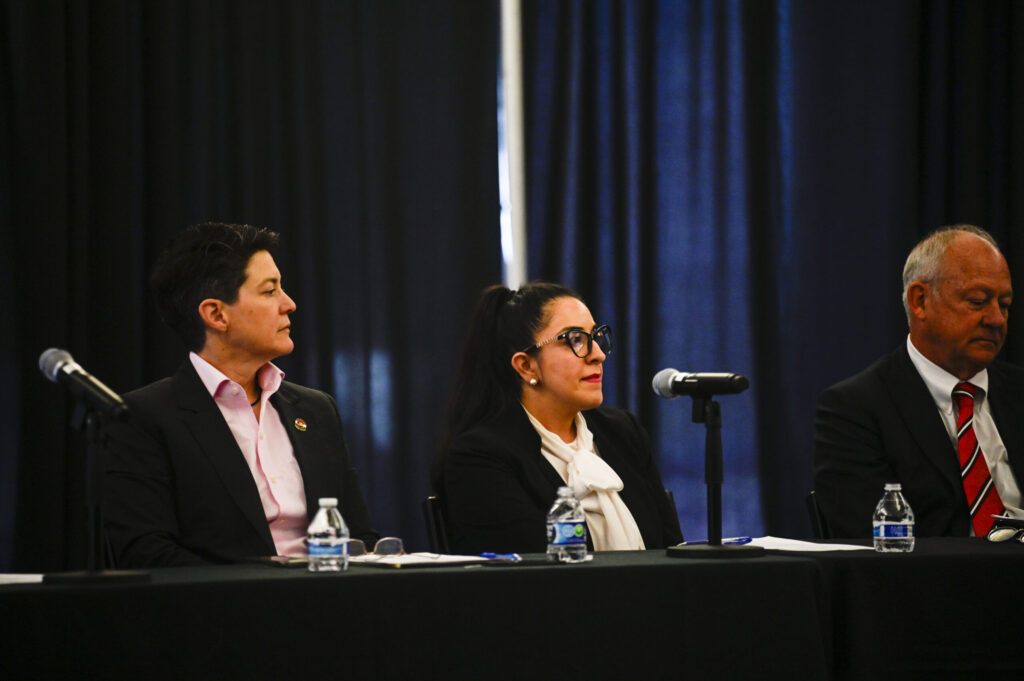10th Circuit directs judge to redo ruling in case of gas station clerk fired for confronting knife-wielding robber
The federal appeals court based in Denver told a trial judge on Tuesday to reconsider her ruling that Circle K lawfully fired a 72-year-old convenience store cashier who attempted to stop a knife-wielding robber from stealing cigarettes.
Mary Ann Moreno, a 16-year employee of the company, was behind the register at a Westminster Circle K store when a man holding two hunting knives asked if Moreno could give him cigarettes for free. When she declined, the man went around the counter to take the cigarettes, prompting Moreno to grab his arm and shirt.
Days later, Circle K fired her, citing company policy that forbids employees from confronting shoplifters. Moreno filed suit against her former employer, alleging it terminated her in violation of Colorado’s public policy — namely, the law’s recognition of a right to self-defense.
Last year, U.S. District Court Judge Nina Y. Wang sided with Circle K, finding Colorado law did not support the idea that an at-will employee may not be fired for exercising self-defense in the workplace.
However, a three-judge panel for the U.S. Court of Appeals for the 10th Circuit believed Wang had looked at the case backwards. Instead of having a federal judge interpret an unclear area of state law implicating the rights of workers, explained Judge Gregory A. Phillips, it would have made more sense for Wang to first answer whether the evidence showed Moreno, in fact, was using self-defense at all, then whether Circle K fired her because of it.
“Though within its power, the district court fielded an uncertain state-law question without addressing two (fact-based) arguments that may have obviated the need for federal predictions about the meaning of state law,” Phillips wrote in the panel’s Dec. 31 order.
In Moreno’s telling of the October 2020 encounter, a knife-wielding robber attacked her while she was trapped behind the counter, prompting her to defend herself. In the process, she made contact with her assailant.
After reviewing the security footage, Circle K managers did not believe Moreno acted in self-defense. Instead, she stepped toward the shoplifter and briefly grabbed his arm and shirt as he reached for the merchandise. Those actions violated the company’s “Don’t Chase or Confront” policy for shoplifters, and Circle K terminated her employment.

Surveillance footage shows Circle K cashier Mary Ann Moreno grabbing a man who is shoplifting cigarettes at her Westminster store.
Circle K moved for summary judgment in Moreno’s lawsuit, asking Wang to resolve the case in its favor without a trial because the undisputed facts supported its side.
Wang observed Moreno’s claim of wrongful discharge relied on the idea that Circle K’s actions undermined “clearly expressed public policy.” Although Colorado’s criminal law recognizes the right to self-defense and the state constitution broadly acknowledges people have the right to defend their lives, Wang did not believe she could find self-defense in the workplace to be a clear public policy.
Consequently, because Moreno’s claim had no legal grounding, Wang did not address whether the undisputed facts showed Moreno was actually acting in self-defense or that self-defense was Circle K’s reason for firing her.

Nominee to be United States District Judge for the District of Colorado Nina Nin-Yuen Wang, testifies before the U.S. Senate Judiciary Committee during her confirmation hearing on Capitol Hill in Washington U.S., May 25, 2022.
During oral arguments to the 10th Circuit panel in November, some of the judges seemed incredulous about the circumstances of the case.
“This is editorializing, but I can’t believe Circle K fired this employee for what we saw on the video,” said Judge Timothy M. Tymkovich.
“Sometimes, the best defense is a good offense. And that’s why it sounds like, to the extent you’re arguing it’s clear she was not defending herself, perhaps she was. She just wasn’t doing it in the way you like,” Judge Joel M. Carson III told Circle K’s attorney.
Despite arguments from Moreno’s lawyer that it was important to overturn Wang’s conclusion and recognize Colorado employees’ right to self-defense in the workplace in an era of frequent mass shootings, Phillips pushed for a different approach.
“What if we look at the video and we don’t see self-defense at all — we see cigarette defense?” he asked. “Were there any cases that you know of … where a woman reaching up and grabbing someone’s sleeve as they’re trying to take cigarettes — and that’s the extent of it — would be considered self-defense?”
“I don’t have a case,” acknowledged Virginia Hill Butler, who represented Moreno.
“And there’s a good reason,” Phillips responded. “She’s defending the store’s product.”
While Phillips expressed doubts about labeling Moreno’s conduct “self-defense,” the panel did not answer the question itself. Instead, it directed Wang to evaluate whether the evidence conflicted to the point where a jury trial would be necessary to decide Moreno’s claim.
If the answer is no, Phillips elaborated, “we may well not need to decide Moreno’s public-policy argument to resolve this case.”
The case is Moreno v. Circle K Stores, Inc.











